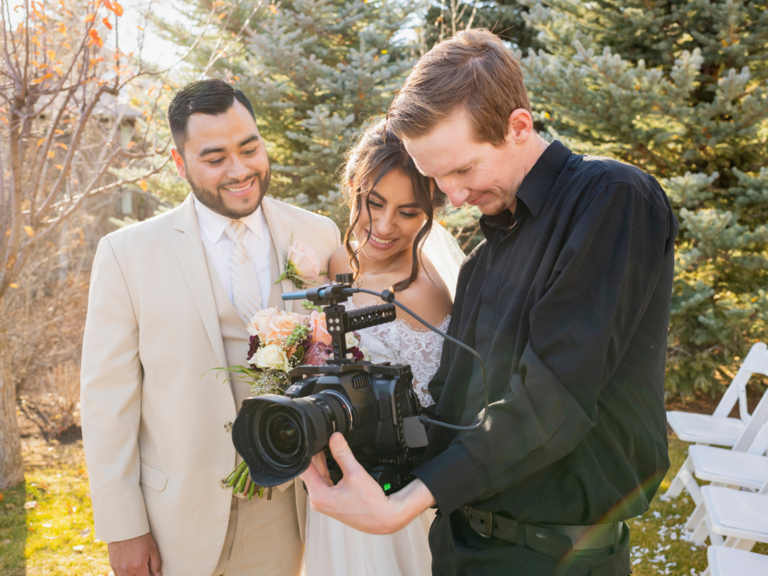Lawyer-Approved Advice to Navigate a Wedding Videography Contract

It's not the most glamorous part of wedding planning, but every relationship with a wedding vendor needs to start with a contract. As soon as you've found the creatives to bring your wedding to life, you need to invest in a wedding videography contract. It may be pages of fine print, but a contract with your wedding videographer will give you the confidence to let the team take your vision and run with it.
Caroline Fox, an attorney who works with wedding professionals, explains, "Contracts make sure everyone knows exactly what they are getting, how much of it, when, and how much it's going to cost. No surprises. That's the key thing I really try to drive home: make that scope of work as specific as possible."
She notes that a simple wedding videography contract explains the who, what, when, where, how many, and how much. "Who are you contracting with? What services are they providing? Get very specific there—use numbers whenever you can. I love using the Brene Brown quote, 'Clarity is kind,'" says Fox.
A wedding videography contract that gets everyone on the same page means it'll be smooth sailing into the video you'll watch for years to come (and show your elderly grandmother across the country!). Here are eight details to look out for in your wedding videography contract.
Need to find the perfect videographer to bring your wedding magic to life? The Knot Vendor Marketplace makes it easy to sort videographers by location and discover the right person to capture your memories on film.
1. General Information
Ashlee Hightower McHugh, an attorney who works with creatives, recommends that every standard wedding videography contract cover a general list of information, regardless of event size or location. "A wedding videography contract should include, at a minimum, the following items and information: the parties to the agreement, event date, event location, and event time; package information and services to be provided; pricing and payment terms; copyright language; cancellation and rescheduling policies; language to address event location guidelines; harassment clause; meal clause; video production and delivery timeline; limitation of liability clause; non-guarantee clause; right of withdrawal clause; and a force majeure clause," explains McHugh.
2. Pricing and Fees
"I generally advise including payment terms that address the total payment owed for the services outlined in the agreement, how the payment will be divided and when the payments are due, and any additional or hourly for services or editing added on outside of the services addressed in the agreement," says McHugh. This should also include how the payment will be submitted and whether there is a late fee.
Fox advises including specific dates and dollar amounts, such as when a nonrefundable retainer fee is due in a contract for a wedding videographer. "The contract should say that it is terminable if not paid by that date," says Fox.



Her emphasis is always on clarity. "By including those exact dates, as opposed to something like 'half of the cost is due six months out,' there is no room for error or confusion," adds Fox.
Is there someone else contributing to the payment? McHugh recommends addressing the parties signing the agreement are ultimately responsible for the payment, even if someone else is writing the check.
3. Style and Structure of Wedding Video
If you fell in love with a wedding videographer's style, you want to be sure that's what will actually be delivered. Include in the contract a clause regarding the style and structure of the video. Spell out the expectations to ensure that both parties are on the same page.
4. Video Shot List
Fox recommends addressing video shot lists in a wedding videographer contract because most couples are learning this process for the first time. "Contractually, I always draft clauses that say 'the videographer/ photographer will make reasonable attempts to obtain requested images from Client's shot list, but due to the fast-paced nature of weddings and events, no specific shot or pose can be guaranteed,'" says Fox.
5. Raw Footage Access
"I end up addressing this a LOT in disputes," says Fox, who notes that typically a couple's computer can't even read the file types that raw video footage would be delivered in. If you do feel strongly about having access to the raw footage, make sure it is addressed in the contract, and expect that there will be additional fees.
Fox explains, "If the couple asks upfront during the contract stage for RAW, or even film negatives, I'd expect an upcharge. It's an extra expense and time constraint for the videographer."
6. Music Licensing
"I like to include language to address music usage and licensing in any final product, the format in which the final product will be delivered," says McHugh. Particularly if you plan on posting your video on social media, it's important to know that the music is actually available to be used publicly.
7. Vendor Meals
If you expect your wedding videographer to deliver an incredible product, they need to be focused on their creative process, not how hungry they are! Include a note about whether they'll receive a meal at the same time as guests, whether they'll have access to snacks throughout the day, and other details regarding on-site food and refreshments. This should also be included in your catering contract.
8. The Fine Print
There is fine print that is included in nearly every contract, and it matters. "Don't forget the oft-forgotten yet oh-so- important 'boilerplate,' things like limitations of liability, indemnification, force majeure (hello, COVID flashbacks!), modifications in writing, cancellations, and postponements," says Fox. "Treat your contract for wedding videography like a prenup—plan for the worst, but hope for the best!"




















